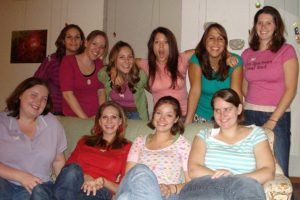With school starting back up, there are many questions regarding health, safety, and learning for students of all ages. With her company, Chicago Home Tutor, Laura Reber, S.S.P. ’09, has been reassuring parents and tutoring students during uncertain times brought on by the COVID-19 pandemic.
With a bachelor’s degree in psychology from Truman State University in Missouri, Reber always knew she wanted to help people. Upon receiving her undergraduate degree, she decided to attend Illinois State University to further her education and get one step closer to reaching her goal.
“I knew ISU had a great school psychology program,” Reber said. “They also had a great reputation for all things education.”
That is when Reber knew she wanted to receive her specialist degree in School Psychology, a degree that provides training in academic and social-emotional needs related to the school setting.
Although Reber claims her time in graduate school was definitely a period of high stress, she thrived in the school psychology program, graduating with a 4.0 grade point average.
Reber spent most of her time with her 12-person cohort in classes, studying, and doing everything in between, including salsa dancing. In addition, she always felt that she had the support of her program’s faculty and staff. “I have the utmost respect for ISU,” Reber said. “I felt this sense of belonging that I didn’t feel before I was in the program and it’s a feeling I long for years later.”
“The stress level is very manageable when you have a tight community like I did,” she added. “You realize how important that is to your life.” To this day, Reber still finds herself in touch with ISU professors and peers from her cohort to ask for professional advice or talk to people who also understand the challenges she faces.
With the help of her peers and her professors along with a drive to help students, upon graduating from ISU, Reber was hired as a school psychologist for the Cicero Public Schools in Chicagoland.
“I learned a lot from working at a school and working with the kids, which is why I ultimately decided to start my own company and create a long-term career,” she said.
With that, Reber founded Chicago Home Tutor in 2015.
Her idea for the company came to light when she realized that she wasn’t connecting to the part of her training she was most excited for during her time at ISU, which centered around academic intervention. Academic intervention focuses on students who do not have a basic understanding of skills used in the classroom, which means they require additional help from outside resources.
Although Reber was certified to work with children who had academic needs, tutoring companies would not hire her because she did not have a degree in education. When she was continuously shut down, she decided to start her own company.
“I wanted to see kids make progress towards their goals socially and emotionally and also receive the one-on-one attention that they deserve,” she said. “I also wanted to do something I love.”
When Reber founded Chicago Home Tutor, she didn’t dream that it would grow into what it is. Fast forward to the COVID-19 pandemic in 2020, and parents and students are recommending her company left and right. Reber’s work has shifted from being a tutor and first-hand facilitating academic success, but she is now on a different side of her company. “I feel like a matchmaker,” she said. “I pair tutors with kids and I like to make it satisfying for everybody,” she said.
Because the pandemic has forced many students online, parents across the Chicagoland area have been reaching out to her and her company of over 100 tutors for academic and emotional support.
“I try to listen to all the parents that contact us,” Reber said. “I want to reassure them that all parents are in the same boat right now.”
Although she knows she can’t help everyone who contacts her, she wants to be a voice of peace and reassurance. Based on the number of parents that have contacted her since schools moved to online learning in March, they fear that when regular school does resume, their children will be behind from all online learning.
There’s no doubt that learning has been affected by the pandemic, but Reber and her team have been doing everything they can to continue effectively tutoring students in the Chicagoland area. “At the start of the pandemic, our approach was to teach online,” she said. “When Chicago entered phase four, we started offering in-person tutoring with safety precautions including masks and staying six feet apart.” Reber explained that some students have circumstances and disabilities that make learning online extremely difficult. There are some students that need more physical prompting.
To accommodate students and her tutors, Reber has been adjusting Chicago Home Tutor’s plan a lot since the beginning of the pandemic, which she explained is the hardest part of her job.
“It’s difficult making a plan and knowing that it will be temporary,” she said. “It’s hard to keep solving problems and readjusting to resolve more and different problems.” “I also feel responsible for other people and their health,” she explained. “I have to navigate health with personal contact and education. What is the balance for that?”
Reber recognizes that many other people, including educators and students, are feeling the same way she does, but does not want people to lose hope or give up on learning. She’s encouraging people to reach out for support and connect with peers. Personally, she has joined many Facebook groups for educators and has found many tools and resources that she was unaware of before. “There are so many resources out there to make life easier,” she said.
Something that has also made her life easier is making a routine for the day, and she suggests it for students that come to her company for tutoring and says, “Hopefully school will give you structure, but it’s also on you to help create it.”
Although living in the times of a global pandemic has presented new challenges, Reber has also found new opportunities that she is grateful for. “Illinois State prepared me well and helped make me an expert in my field,” she said. “It not only gave me a solid foundation in the school of psychology, but also the academic and social-emotional needs of people.”
Among those emotional needs for all people is to recognize that it is a tricky time. She is here to reassure people, especially parents, educators, and students, that different is not bad and that together, we will all get through this.



